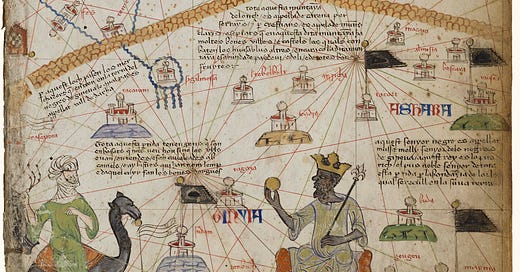Black Is Wealth
Welcome to the 1st issue of Black To School! ✨
Across the world, many of us are now at a point in our lives (due to personal growth, the Black Lives Matter movement, becoming a new parent, or other major life changes) where we’re more curious than ever about our contributions to the world at large. We’re excited to learn together and collectively be the change that we want to see in our own lives, homes, and communities. We hope Black To School can play a small part in the wider conversation around celebrating Black people as well as Black contributions.
To kick it off, we’re exploring our legacy of wealth and wealth building all through February! In this issue we’ll:
Learn about the African King Mansa Musa, the wealthiest man in history with a fortune that rivals modern billionaires to this day.
Share resources that inspire you to create wealth with the help of your family, friends, and others.

Meet the Wealthiest Person Ever
Contributor: Chinwe Onyeagoro
Many people dream of being wealthy, but some of us might not believe that being well-off is even a part of our story. As a mom, I have to believe. I work a lot of long hours and make sacrifices every day in order to give my kids a better shot at being financially secure. I want them to live life on their own terms and know that Black wealth is attainable.
Here’s the good news, Black wealth isn’t a new thing.
There are so many examples that we don’t often consider or share! Did you know that between South Africa, Egypt, Nigeria, Morocco, and Kenya there is collectively about $1.38 Trillion dollars of wealth and almost 80,000 millionaires? Check out this list of wealth breakdown by country in Africa.
One of the greatest examples of Black wealth comes from the King of Mali, Mansa Musa (1280 - 1337). During the Middle Ages, he expanded his empire and became one of the wealthiest people to ever live (watch this short TED-Ed video on Mansa Musa to get a quick overview)! He’s still considered one of (if not the) wealthiest people ever, with an estimated net worth of over $400 Billion! To put that into perspective, Mansa Musa was more than 2 times wealthier than the richest men alive today, Tesla CEO Elon Musk and Amazon CEO Jeff Bezos.
Although King Musa was born into royalty, he used his power to continue to grow the wealth of Mali, and he ultimately controlled about half of the world’s supply of gold. He had an operation going that rivaled the Rockefeller’s stronghold over oil. His genius was in securing and controlling the trade routes in and out of Mali, rather than solely controlling the actual supply of gold and salt. He would tax traders from North Africa and Europe who would come with goods ranging from paper, silk, and spices to horses and even weapons.
During his reign, he expanded the Kingdom of Mali by adding 24 cities to its territory and pouring funds into Timbuktu, which became a global commercial center for scholastics, arts, commerce, and architecture. As a result, Mali and Mansa were both added to the Catalan Atlas, the most popular map at that time.
It’s amazing to be able to look back at the scale of industry going on in Africa during different time periods! The lesson that I draw for my kids is that Black people have been wealthy throughout history and continue to be today, and there are no limits to what they can achieve.
🛠️ The Black To School Toolkit
Now What? Dig Deeper with Friends, Family, and Others.
Looking for a longer read on King Musa? Check out this case study by the University of Oxford’s - Oxford Centre for Global History. If you’re more of an audio or video person, we've got you covered. Look through the case study endnotes for even more A-List sources on the impact of Mansa Musa.
Ready to start a new relationship with money? Join the LiveRicherChallenge -- a free 22 day challenge created by Tiffany Aliche, The “Budgetnista.” Also, check out the Melumenation Facebook Group -- a space to dive into master classes on Black history & economic empowerment, founded by Be/Come Immersive, Hidden Pages, & ATCP.co.
Want to give your kids a head start on their financial literacy? Play games as a family: Cashflow for Kids age 6+ (by Robert T. Kiyosaki), Monopoly ages 8+ (by Hasbro), and The Entrepreneur Game age 12+ (by EE Speaks). You can also download the Goalsetter app, developed by Tanya Van Court, to teach your kids about budgeting, saving, investing, donating, and more.
Looking for some helpful resources to pass along to others? Share this crash course on Mansa Musa by John Green. For kids under the age of 10, check out this great kids-focused video on Mansa Musa.
Still not sure why Mansa Musa matters? Take a tour of the Caravans of Gold exhibition curated by Northwestern University’s Block Museum, the National Endowment for the Humanities, and the Smithsonian. There are over 250 archaeological artefacts that are evidence of Mansa Musa’s existence, unparalleled wealth, and the key role that his kingdom played in controlling the world’s gold market.
⌛ The Black To School Timeline
Black People Have Always Been Wealthy.
In this issue, we did some exploring in the Middle Ages (Over 700 Years Ago) The Person: Mansa Musa, King of Mali, whose fortune is valued at $400 Billion (in today’s dollars), cornered the market for gold, made Timbuktu a global commercial center, and, as a result, Mali was added to the world map.
Next week, we’ll check out the Late 19th & Early 20th Centuries (Nearly 150 Years Ago) The Place: Black Wall Street, a town founded in 1906, which at its peak had over 10,000 residents, hundreds of Black entrepreneurs, and thousands of professionals. Together, they were the wealthiest, self-sustaining Black community in the Western world.
About This Week’s Contributor
Chinwe Onyeagoro
My name is Chinwe Onyeagoro. I have two toddlers under the age of 4, and I’m the CEO & Co-Founder of a tech company called PocketSuite.io. I know firsthand how difficult it can be for parents to carry the full weight of educating their kids about the wide and wonderful world. I was really inspired when I learned about the history of Saturday Schools! If you missed “The Back Story” letter, I encourage you to watch this talk by rapper, poet, and journalist, Akala, who himself is one of the most amazing examples of the power of the Saturday School model. I see the Black To School newsletter as a modern day virtual Saturday School, focused on telling the story of Africans and the African Diaspora that we can all learn, share, and draw strength from with our kids, family, friends, and network.
About Black To School
Black To School is a collaborative volunteer effort focused on sharing Black history, collecting helpful resources, and creating a safe space for discussion. Learn more about us here and join our Slack community to keep the conversation going. All are welcome!
And if you’re passionate about this type of work and want to help out, please let us know! The best way to get in touch is by emailing info@blcktoschool.com with “volunteer” as the subject.






